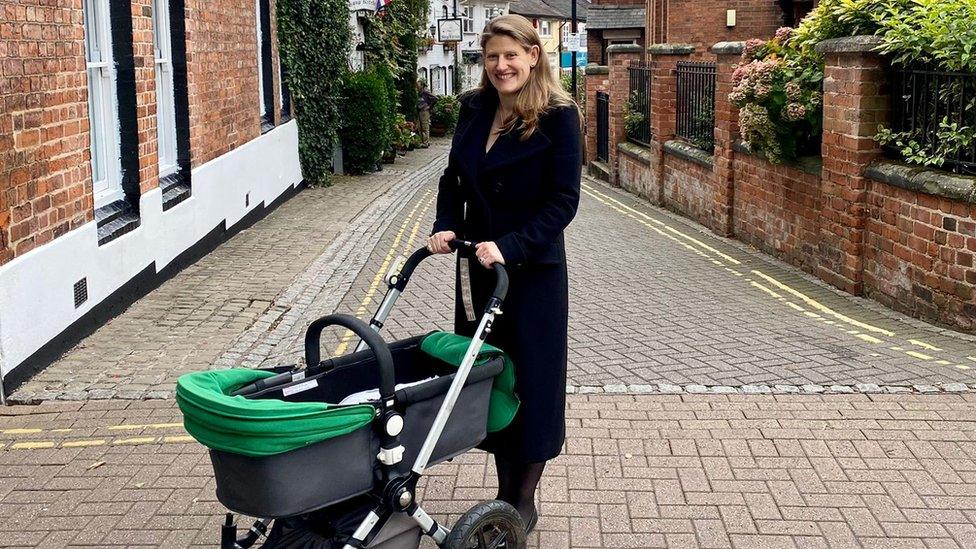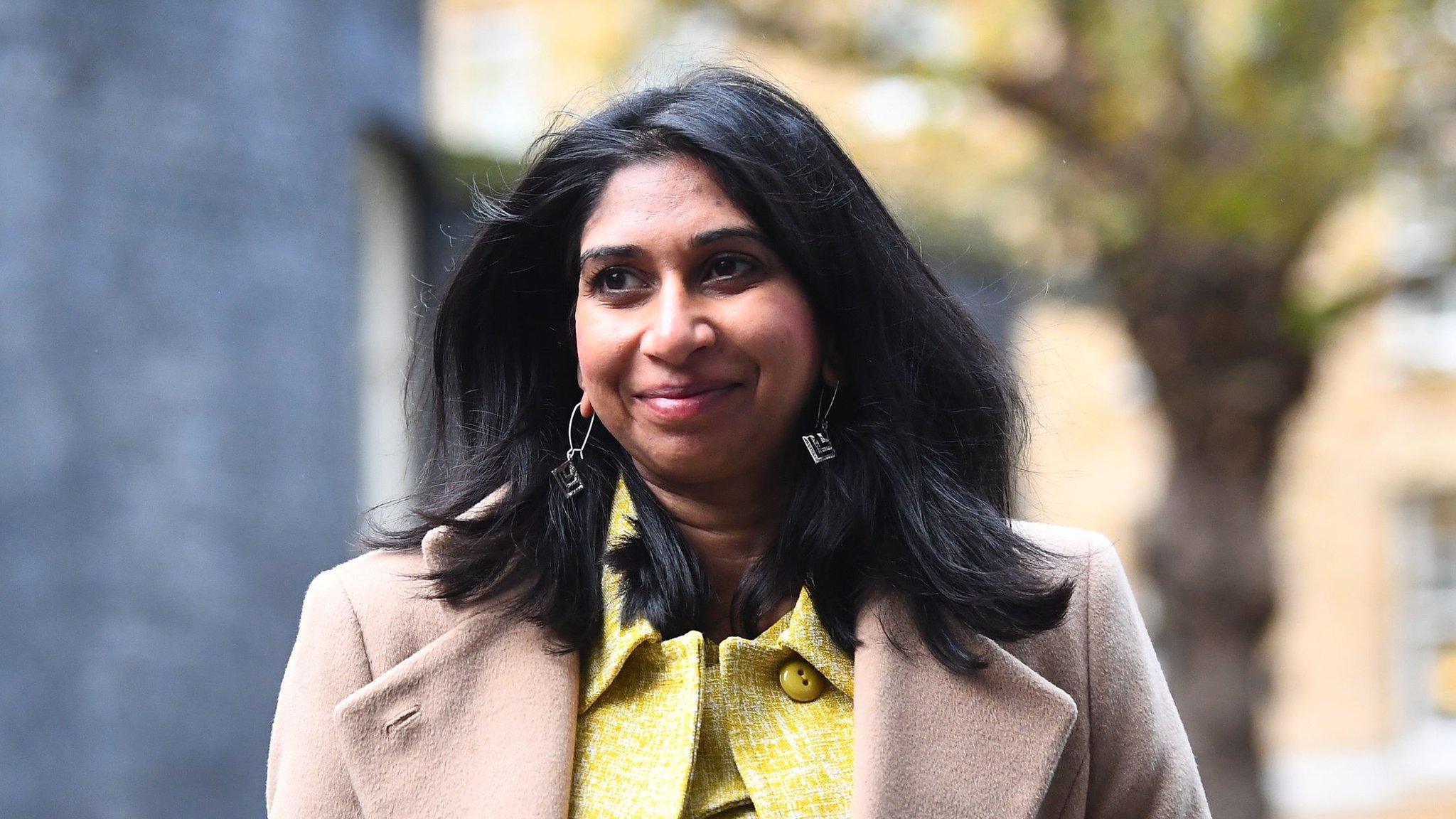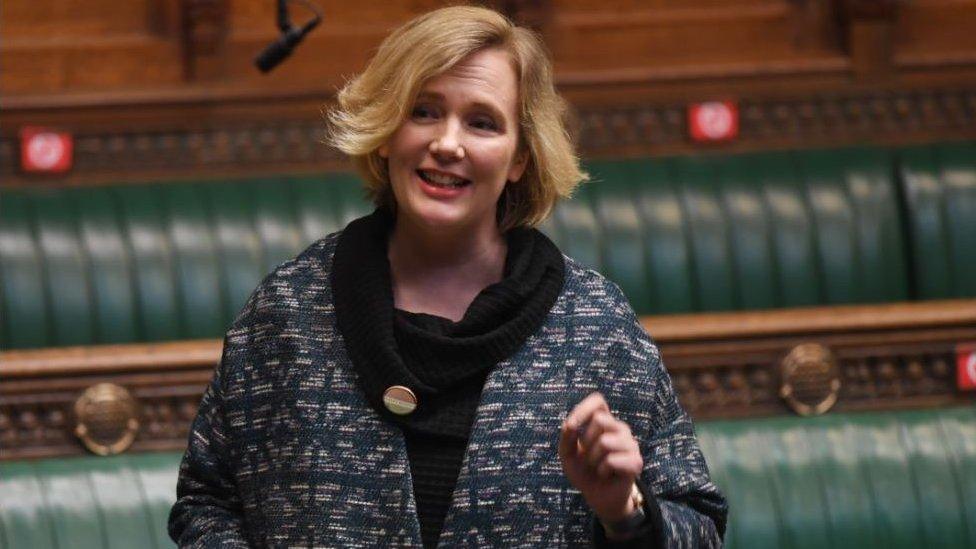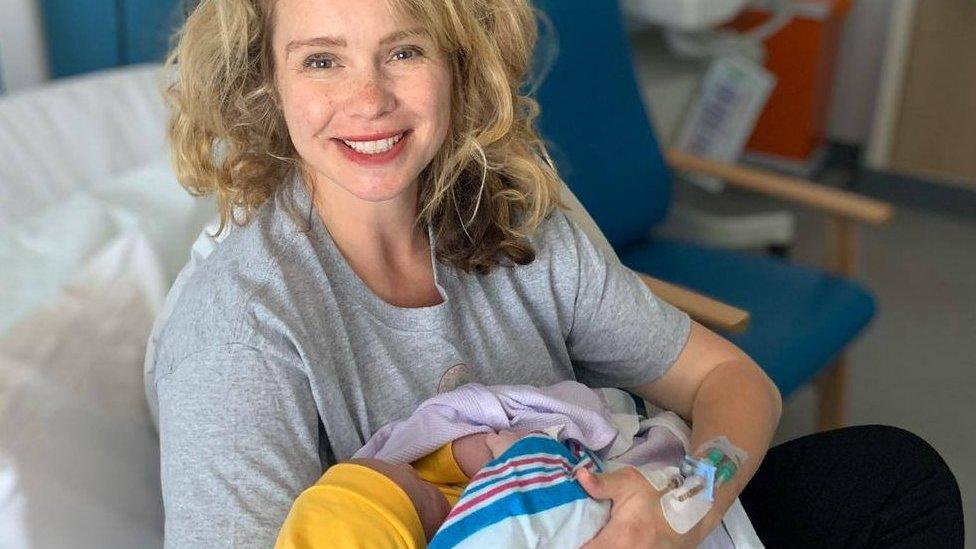Tory MP dismayed by abuse received for taking maternity leave
- Published

The MP for Stafford said the climate for women in public life was now toxic
A Conservative MP has revealed she has received dozens of phone calls from angry constituents who have berated her for taking time off after the birth of her child.
Theo Clarke had her daughter in August and is taking six months' maternity leave.
She says she is working, including attending events and voting by proxy, while caring for her baby at home.
But some constituents have demanded her immediate return to full-time work.
"I find it shocking that, according to these people, women should not have children and be an MP when the very fact they are mothers is so valuable," the MP for Stafford said.
Employees are legally entitled to a year's maternity leave under the 2010 Equality Act in the UK.
While MPs - who are officeholders, not employees - are not eligible for statutory maternity leave, there are provisions to help manage their workload.
All MPs are paid in full while on maternity leave, but not all their duties in Parliament are covered during their absence.
In comments noted by Mrs Clarke's office, one constituent said: "She had the baby in August, I pay her wages, tell her to get back to work."
Others said MPs cannot "go off and have children" and the constituency needed a "hard-working" representative who "doesn't just take six months off when she fancies it".
The MP, 37, said many locals refused to see one of her senior members of staff when they were offered appointments.
"I demand to see my MP, not a junior secretary," one said.
In posts on social media, some locals say they have repeatedly tried to contact the MP, with some claiming they have never had a response from her office.
Mrs Clarke said she regularly hides or blocks comments on Facebook and Twitter from those unhappy she had a child while in office.
The MP said she was "dismayed but not surprised" by the reaction to her maternity leave and condemned a "toxic atmosphere towards female politicians".
"I've decided to call out this abuse as I don't believe that women should have to choose between being a politician and a mother," she said.
"This is the 21st century and we can do both. And if we want to have a more inclusive and representative democracy then we need more women to stand for public office."
In a tweet, external, Conservative Party chairman Nadhim Zahawi said it was "sad to see a small number of people with nothing better to do than criticise" Mrs Clarke, calling working mums "heroes".
Other female MPs have faced similar criticism for taking maternity leave. In 2020, the Conservative MP for Stroud, Siobhan Baillie, said she received "abusive emails, calls and social media posts" during her maternity leave.
'Fair development'
In 2021, Boris Johnson's government passed a new law that introduced formal paid maternity leave for senior ministers.
The legislation allows cabinet ministers to take six months' paid leave while the salary costs of their temporary replacement are covered.
This was used by Suella Braverman when she was attorney general following the birth of her second child in 2021.
Backbench MPs do not have the same right to maternity cover.
Mrs Clarke told the BBC she wanted to see this legislation "extended to MPs in positions like mine" in what would "seem a logical and fair development".
The BBC put this to the office of the speaker for the House of Commons, but no comment was offered.
Citing the suffragettes, Stella Creasy calls for all MPs to be given parental leave
In 2019, Labour's Stella Creasy became the first MP to be given maternity leave cover, after a battle with the parliamentary authorities, who, she says, had told her it was not possible under parliamentary rules.
The employee covered constituency work but could not sit in the House of Commons or vote.
The mother-of-two has previously threatened to sue Parliament after her request for full maternity cover was rejected.
Ms Creasy said "it's women who pay the price" and in any other workplace, "the lack of proper formal cover would be a matter for an employment tribunal".
The Labour MP for Walthamstow, who has been campaigning to get more women into politics through her This Mum Votes Project, said the situation was bad for the economy and equality.

Parental rights in the UK
New mothers are entitled to take up to 52 weeks of maternity leave
They must take at least two weeks' leave after the baby is born (or four weeks if they work in a factory)
They are eligible to be paid for six weeks at 90% of their average weekly earnings and 33 weeks at £149 per week or 90% of their average weekly earnings (if lower)
Fathers can take two weeks' statutory paternity leave at £149 a week

- Published25 February 2021

- Published11 February 2021

- Published29 May 2020
